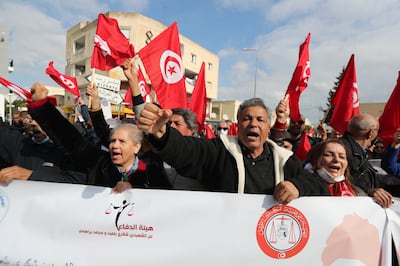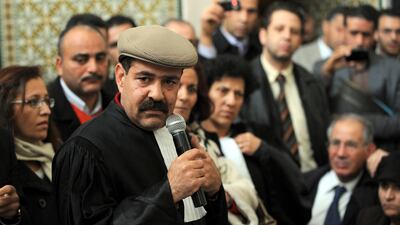Four people have been sentenced to death over the assassination of prominent Tunisian leftist politician and lawyer Chokri Belaid.
Prosecutors also handed down sentences ranging from two to 120 years to 19 otherss.
Five were not sentenced due to previous convictions in terrorism-related cases, Aymen Chtiba, deputy public prosecutor in the antiterrorism judicial division told state-owned TV station Al Wataniya on Wednesday.
Mr Belaid, leader of the leftist Democratic Patriots Unified Party, better known as Watad, was shot and killed outside his home in February 2013.
He was one of the most vocal critics of Ennahda, the ruling party at the time.
His assassination prompted mass protests and eventually lead to the resignation of Prime Minister Hamadi Jebali, who was one of Ennahda's leaders.
Investigations into the assassination had stalled due to difficulties including Tunisia's politically charged environment and security situation, following terrorist attacks and activities by ISIS and Al Qaeda affiliates. One of these groups, the Salafist group Ansar Al Sharia, claimed responsibility for Mr Belaid's assassination.
Throughout the years, Ennahda has faced allegations that it was complicit in the assassination of political opponents by an alleged “secret apparatus” within state security institutions.
The allegations were mainly made the defence committee for Mr Belaid and Mohamed Brahmi - another politician assassinated in July of the same year - which was formed by the families of the two men.
Ennahda also faced allegations of undermining the independence of the judiciary and being the primary force behind the stall in investigations into Mr Belaid's death.

Mr Belaid's assassination coincided with a rise in religious extremism and terrorist attacks in Tunisia.
He had faced several threats and public accusations of blasphemy – sometimes made by senior Ennahda officials such as Sahbi Atig and Habib Ellouze – due to his leftist ideology.
Many Tunisians have accused Ennahda of being indirectly involved by encouraging the rhetoric of some of its followers at that time.
The party has repeatedly dismissed the claims, describing them as defamation and attempts to discredit its rule.
On Wednesday, Ennahda welcomed the sentences and considered the final rulings of the judiciary as “a definite proof of its innocence.”
“[Ennahda] considers that these sentences should end the exploitation of the martyr’s death and restore respect to those who have been subjected to false political accusations, especially our leader, Mr Rached Ghannouchi,” the party said.
Wednesday's verdict was described as “a positive step” by Mr Belaid's family. However, they said it is still necessary to uncover those who are suspected of masterminding the assassination.


